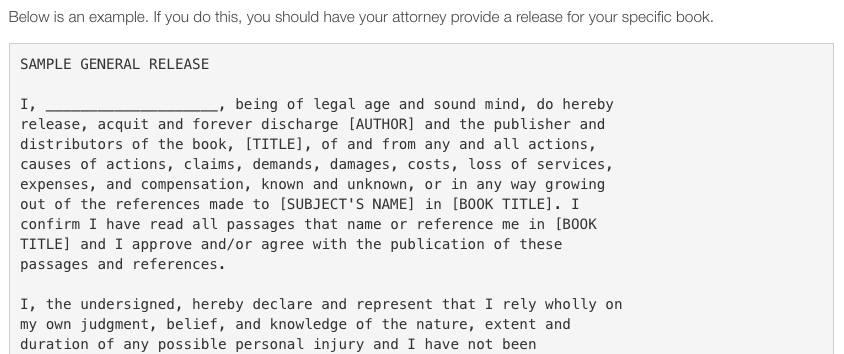Don't Make These 7 Mistakes When Penning Your Memoir

Writing a memoir isn’t for the faint of heart.
It requires bravery, unflinching honesty, and the ability to turn your life lessons into universal truths. Most mere mortals can’t write a compelling memoir-- but that’s not due to lack of material. It’s because few people, writers included, understand the mechanics of non-fiction storytelling.
How do you write about something that actually happened without revising the truth, offending your loved ones, or boring your readers to tears?
If you’re writing for entertainment, how do you create a memoir that appeals to readers who don’t know you?
If you’re writing to document your life for future generations, how do present your life in a fresh, insightful, and authentic way?
You can start by sidestepping the most common mistakes. Let’s take a look at the top 7 mistakes that many memoirists make when retelling their lives for entertainment or posterity.
Here’s a list of best practices to remember when you’re penning your memoir. Subscribe to receive this extra resource.
Mistake No. 1: Covering Too Much
A memoir is not an autobiography.
An autobiography usually contains reflections that one can only acquire from the vantage point of old age. So, an autobiography often starts at birth and follows the writer through youth, a string of questionable decisions, two or more rocky relationships, eventual triumph, and ultimately to old age.
But, a memoir is not like that. While an autobiography is often written at the perceived end of one’s life, a memoir can be tethered to any huge event in one’s life. A memoir is a slice of life. You can document anything, including the death of a loved one, the birth or adoption of a child, summer camp, a religious awakening, becoming an adult, journeying to a different country, or adjusting to the new home, just to name a few ideas.
If you lived it, you can write it.
But, it would be a mistake to write about everything that you’ve experienced in your life at one time. Unless you’re a public figure, very few people are interested in reading about your life from cradle to almost grave. It’s much more impactful, even for public figures, to write about key, transformative events in their lives.
Not sure how to whittle down your epic life into a measly memoir? Remember, you don’t have to write just one memoir. Isn’t that so liberating? Over the course of your life, you can write several memoirs about the different events that shaped who you are.
What event would take up at least one chapter of your autobiography? Take that chapter and expand it into an entire book. A memoir gives you the opportunity to dig deep into a pivotal event or explore how you felt, why you felt it, and the lessons you learned.
Mistake No. 2: Not Finding the Bigger Story
What will the reader learn from your story?
Figure out what lessons you learned from going through the event that is documented in your memoir. Mine for nuggets of truth. Many people use memoirs as a time of self-reflection and even therapy.
If you’re not sure what lessons you’ve learned, focus on what your story is about. This is the theme of your story. Your story’s theme can help clarify what you’ve learned.
Some common memoir themes surround the following topics:
- Accepting change
- Adjusting to a new life
- Coming of age
- Compassion
- Dealing with loss
- Determination
- Discrimination
- Friendship
- Greed
- Hard work
- Hope
- Leadership
- Making tough choices
- Overcoming adversity
- Parenthood
- Poverty
- Self esteem
- Survival
- War
- Wealth
Do one of those topics (and associated themes) apply to your memoir? What statement does your memoir make about this topic?
For example, I wrote a memoir about losing my mother to cancer. I was 13 at the time, so it was a combination of dealing with loss and coming of age. If I wasn’t sure what lessons I learned, I’d ask myself, “What did losing my mother at a young age teach me about death or loss?” or “How did my mother’s death affect my transition into adulthood?”
The answer would be the big idea of my story. You see, when you tell a story, it’s not just for you and your processing, it’s for the reader, too. They should be able to come away with a satisfying truth about life-- especially when reading a memoir.
Just like you wouldn’t tell a story to someone face to face without connecting to a point so you shouldn’t do that with your memoir, either. Always keep the big idea in mind.
Don’t beat yourself up if you don’t have a big idea yet. You can totally start writing your first draft without any idea of your story’s theme or life lesson. Sometimes, the theme becomes obvious after the first draft is on paper.
Mistake No. 3: Starting at Birth
Chances are, you don’t remember when you were born-- so why start your memoir at birth? You’ll have to rely on other’s perceptions (at best), and the point of your memoir is to start with your memories.
So, unless you have a really good reason, don’t start your story until you’re at an age where you can actually remember events.
And besides, starting at birth is a slow way to go. Most readers want to dive into the action, not wait for you to hit the major life event somewhere around page 173.
Remember that your memoir doesn’t have to be told in chronological order. You can jump around and insert flashbacks and backstory.
Also, your memoir doesn’t have to cover an extended period of your life. One decade, two years, three months, four hours-- you’re not obligated to a specific time period for your memoir. So, choose what makes most sense for telling your memoir.
Mistake No. 4: Not Outlining

To outline or not to outline…
Everyone has an opinion on outlining, but my opinion is to go for it-- especially with a memoir.
One of the biggest reasons against using an outline is that it’s restrictive. An outline can confine you to a certain path of events. But,when you’re recounting the actual events of your life, there’s not much wiggle room.
For creative non-fiction like memoirs, outlining won’t hurt the creative process, but will actually help it. Outlining allows you to recall things that you may have forgotten, including dates that inevitably get jumbled up over the years.
Your outline doesn’t need to be strict, but it should include a list of key events leading up to and following the climax of your memoir.
If you like the idea of outlining, take it a little further. Divide your memoir into chapters and sketch out what you’d like to discuss in each chapter. This type of outline can help you stay on course, especially if you have a tendency to meander and digress.
Mistake No. 5: Not Protecting Yourself From Lawsuit
When you’re writing about other people, you face the possibility of getting sued. It sucks, but it’s better to be safe than sorry.
If you’re planning to write about individuals who may not like what you have to say, it’s generally a good idea to change the person’s name and individual characteristics. You may even need to change the location, and alter a few other identifying clues, like place of employment. Another option is to write under a pseudonym.
But if some one’s hell-bent on suing you, this may not protect you.
What will protect you is asking all of the people who you discuss in the book to sign a general release form. Make sure you notarize it, too.
Check out this sample release form from Angela Hoy at WritersWeekly.com.

Image Courtesy of WritersWeekly.com
Mistake No. 6: Forgetting Your Audience
Who are you writing for?
Always keep your audience in mind as you’re writing your memoir. They’re just as important as the story you’re telling. If your story doesn’t resonate with the audience, there’s no need to even tell it to them.
Who you’re writing for will change how you tell the story.
If you’re writing for an audience that doesn’t know you personally, you should explore the bigger ideas of your narrative. This is important so that those without a personal stake in your story will be able to glean larger truths.
Also remember that an audience who’s unfamiliar with your story won’t be drawn to it without a compelling topic.
If you’re writing for your family or future generations, the way that you frame your story may be different. Chances are, these readers will be familiar with some of the key players in your memoir, so you can use your narrative to create a new perspective of those family members. You can also use your memoir to document and share insight into your mindset during those pivotal events.
Mistake No. 7: Not Editing
Editing is a must, particularly with a memoir.
While you don’t have to be objective about the events within the narrative (it is your life’s story, no one expects you to be completely removed), you do need help to sort through the mechanics of non-fiction storytelling.
This is why you need to work with a professional editor. A professional editor will help you identify the parts of your story that are flaccid and unnecessary. He or she will help you tidy up your narrative so that you can tell the best story possible.
We can help you shape up your memoir narrative. Get started with our manuscript critique now.
Additional Resources
Before you go, here are a few related posts to check out:
Here’s a list of best practices to remember when you’re penning your memoir. Subscribe to receive this extra resource.




